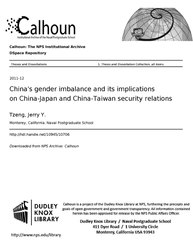File:China's gender imbalance and its implications on China-Japan and China-Taiwan security relations (IA chinasgenderimba1094510706).pdf

Original file (1,275 × 1,650 pixels, file size: 509 KB, MIME type: application/pdf, 72 pages)
Captions
Captions
Summary
edit| China's gender imbalance and its implications on China-Japan and China-Taiwan security relations
( |
||
|---|---|---|
| Author |
Tzeng, Jerry Y. |
|
| Title |
China's gender imbalance and its implications on China-Japan and China-Taiwan security relations |
|
| Publisher |
Monterey, California. Naval Postgraduate School |
|
| Description |
The purpose of this thesis is to investigate how China's gender imbalance could affect East Asian security with respect to China-Japan relations and China-Taiwan relations. The research result is ambiguous in that China's excess males may or may not force the Chinese government to adopt a more aggressive foreign policy stance with Japan and Taiwan. On the one hand, the Chinese government has been relatively calm in its dealings with Japan and Taiwan despite the rise of Chinese nationalism. The Chinese government actively contains anti-social behaviors associated with excess males without seriously affecting bilateral relations with Japan or Taiwan. On the other hand, appealing to nationalistic fervor in order to strengthen regime legitimacy could force the Chinese government to be more belligerent. Inaction by the Chinese government in response to Japanese or Taiwanese provocation could compel many in China to engage in mass uprising against the state, thus threatening the regime's power. This thesis also provides possible options to mitigate the social and political tensions presented by these excess males and to prevent potential regional instability. Options such as war, public works projects, foreign marriage tax, population control, testosterone reduction, state-sponsored matchmaking service, and UN peacekeeping are explored. Subjects: Males.; China; Japan; Taiwan; Gender Imbalance; Excess Males; Cross-Strait; Sino-Japanese; Valerie Hudson; Andrea den Boer; China-Japan Relations; China-Taiwan Relations; One-Child Policy; Male Preference; |
|
| Language | English | |
| Publication date | December 2011 | |
| Current location |
IA Collections: navalpostgraduateschoollibrary; fedlink |
|
| Accession number |
chinasgenderimba1094510706 |
|
| Source | ||
| Permission (Reusing this file) |
This publication is a work of the U.S. Government as defined in Title 17, United States Code, Section 101. Copyright protection is not available for this work in the United States. | |
Licensing
edit| Public domainPublic domainfalsefalse |
This work is in the public domain in the United States because it is a work prepared by an officer or employee of the United States Government as part of that person’s official duties under the terms of Title 17, Chapter 1, Section 105 of the US Code.
Note: This only applies to original works of the Federal Government and not to the work of any individual U.S. state, territory, commonwealth, county, municipality, or any other subdivision. This template also does not apply to postage stamp designs published by the United States Postal Service since 1978. (See § 313.6(C)(1) of Compendium of U.S. Copyright Office Practices). It also does not apply to certain US coins; see The US Mint Terms of Use.
|
 | |
| This file has been identified as being free of known restrictions under copyright law, including all related and neighboring rights. | ||
https://creativecommons.org/publicdomain/mark/1.0/PDMCreative Commons Public Domain Mark 1.0falsefalse
File history
Click on a date/time to view the file as it appeared at that time.
| Date/Time | Thumbnail | Dimensions | User | Comment | |
|---|---|---|---|---|---|
| current | 15:58, 15 July 2020 |  | 1,275 × 1,650, 72 pages (509 KB) | Fæ (talk | contribs) | FEDLINK - United States Federal Collection chinasgenderimba1094510706 (User talk:Fæ/IA books#Fork8) (batch 1993-2020 #11293) |
You cannot overwrite this file.
File usage on Commons
The following page uses this file:
Metadata
This file contains additional information such as Exif metadata which may have been added by the digital camera, scanner, or software program used to create or digitize it. If the file has been modified from its original state, some details such as the timestamp may not fully reflect those of the original file. The timestamp is only as accurate as the clock in the camera, and it may be completely wrong.
| Short title | China's gender imbalance and its implications on China-Japan and China-Taiwan security relations |
|---|---|
| Image title | |
| Author | Tzeng, Jerry Y. |
| Software used | Tzeng, Jerry Y. |
| Conversion program | Adobe PDF Library 10.0 |
| Encrypted | no |
| Page size | 612 x 792 pts (letter) |
| Version of PDF format | 1.4 |

